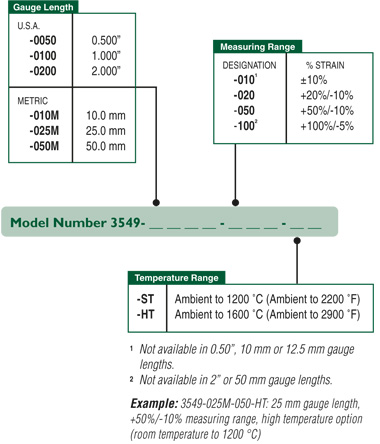The Epsilon MODEL 3549 features a very low sensitivity to vibration and hence is suited for high temperature, strain controlled axial testing and other normal test methods. It is possible to connect this model to the test sample in a few seconds.
The MODEL 3549 marks a breakthrough in the design of externally mounted furnace extensometers.
This latest extensometer is developed to satisfy the strict demands of strain controlled testing as mentioned in ISO 6892, while offering a number of new features that will enhance productivity with static testing applications such as compression and tension testing and long term testing like creep and low cycle fatigue.
The design is such that it is not affected by impact from external vibrations. The unit also includes a novel feature enabling the user to accurately fix the contact force against the test specimen.
This enables a repeatable and even contact force restricting contact force-induced errors. This extensometer is mounted on a slide bracket which can attach to the load frame of the test system and optional load frame mounting brackets are offered.
The gauge length is set automatically before mounting on the test specimen enabling hot mounting after reaching a thermal equilibrium.
The Model 3549 standard temperature version is designed to be used in split type materials testing furnaces to 1200°C (2200°F) and is inclusive of water-cooled bracketry.
The extensometer finds applications in carousel systems for quick high temperature testing since the high temperature option enables temperatures up to 1600 °C (2900 °F).
The standard temperature instrument (to 1200 °C) is equipped with high purity alumina rods. The high temperature instrument comprises alpha grade silicon carbide rods.
The rods are customized as per customer’s requirements. It is possible to integrate mounting brackets with the furnace cut-out. Load frame mounting brackets can be provided by Epsilon to fit the test frame.
The Model 3549 extensometers are strain gaged devices and they show compatibility with any electronics developed for strain gaged transducers. They are mostly linked to a test machine controller. The signal conditioning electronics for the extensometer is included along with the test machine controller.
In this case the extensometer is supplied along with the appropriate wiring and connector for direct plugging into the electronics. For systems that do not have the needed electronics, Epsilon offers a range of solutions enabling connection of the extensometer output to data acquisition boards, chart recorders or other equipment.
Key Features
The key features of the Model 3549 extensometers include:
- They are developed for those applications that need greater than ±0.10 inches (±2.5 mm) full scale measuring range.
- Can be left on through specimen failure
- The extensometer is developed such that it satisfies the demands of strain controlled testing as is required by ISO 6892, and also more common testing. The model 3549 isolates strain sensing components from outside vibrations.
- Using Epsilon’s innovative auto-setting mechanism, the gauge length is automatically set between each test and enables the device to be mounted to the sample in just a few seconds.
- The included contact force setting assembly enables convenient control of the low contact force.
- With the same amount of force, this enables easy repeatable placement of the extensometer on subsequent specimens.
- A novel slide mount enables the extensometer to engage the specimen after achieving the test temperature.
- All models can be used for cyclic testing and also measure in both tension and compression
- By using gauge length spacers, the gauge length of the 3549 can be easily adjusted to almost any gauge length
- Road length configurations may impact the final class rating and most standard units satisfy existing ASTM class B-1 and ISO 9513, class 0,5 requirements for accuracy
- Quick attach connectors are provided with the 3549 for the water cooling lines and the electrical connections, enabling easy installation of the extensometer body
- The model features dual, rugged flexure design for enhanced performance
- The 3549 can be used in carousel systems or with single furnaces
- Full bridge, 350Ù strain gaged design for compatibility with almost any test system.
- In both directions, mechanical overtravel stops are possible
- All units are provided with either high purity alumina ceramic rods (1200°C) or alpha grade silicon carbide rods (1600°C)
- Includes high quality foam lined case and a spare set of ceramic rods
Epsilon MODEL 3549 High Temperature Hot Mountable Furnace Extensometers

Model 3549 with a 25 mm gauge length shown with a split furnace

Model 3549 contact force scale for repeatable placement against test specimens

Model 3549 with 25 mm gauge length
Model 3549 Available Versions
The following gauge length and measuring range combinations are available except as noted. All are available in the listed temperature ranges. With special order, other configurations may be available.

Options
Optional accessories available include the following:
- Model 2050 constant temperature water re-circulating bath
- High temperature option (-HT suffix) for use to 1600°C
- Load frame mounting brackets
- Connectors that are compatible with any brand test equipment
- Rod tip styles - straight chisel, vee chisel, conical tip are available